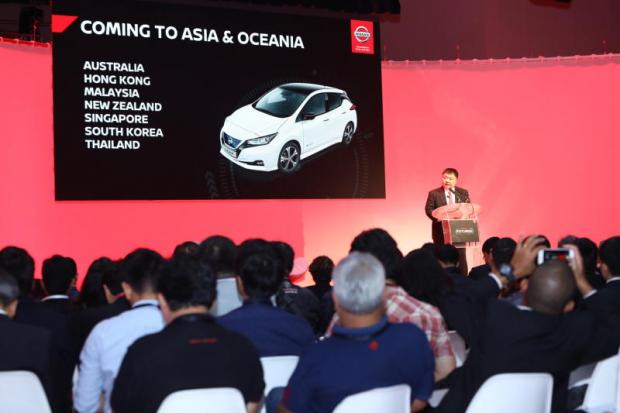
Nissan Motor Co will begin selling its 100% electric Nissan Leaf in seven markets in Asia and Oceania, including Thailand, during the fiscal year that starts in March.
This plan underscores the company's commitment to a cleaner, more efficient driving future, senior vice-president for Asia and Oceania Yutaka Sanada said at the "Nissan Futures" showcase in Singapore.
Nissan will launch the model in Australia, Hong Kong, Malaysia, New Zealand, Singapore, South Korea and Thailand.
The company is also exploring introduction of the zero-emission car in other markets in the region, including Indonesia and the Philippines.
"The company is working to bring the new generation of the world's best-selling electric vehicle to as many markets as possible," Mr Sanada said. "Nissan also is studying demand in Indonesia and the Philippines ahead of the new Nissan Leaf's next launch phase."
Nissan has sold more than 300,000 Leafs globally since the model first went on sale in 2010. The company introduced a fully redesigned Nissan Leaf in September 2017.
The Leaf's new electric powertrain delivers 110kW of output and 320Nm of torque.
Deliveries of the five-door hatchback Leaf began in Japan in October 2017, priced at ¥3.15 million (896,000 baht), followed by the US and Canada in January.
The car will go on sale in Europe in February and will eventually be available in more than 60 markets worldwide.
Nissan held showcases for the Leaf and Nissan Note, a five-door hatchback with e-Power technology, at the Thailand International Motor Expo late last year.
Meanwhile, a Nissan-commissioned study by Frost & Sullivan, "Future of Electric Vehicles in Southeast Asia", said that one in three Southeast Asian consumers planning to buy a car are open to purchasing an EV.
"The finding demonstrates the region's strong potential to speed up the electrification of mobility," Mr Sanada said.
According to the study, 37% of consumers in Singapore, Indonesia, Thailand, Malaysia, Vietnam and the Philippines have considered buying an EV for their next car.
Customers in the Philippines, Thailand and Indonesia emerged as the most enthusiastic about electric cars.
The study said lower costs would prompt more people to consider EVs. Three in four respondents said they were ready to switch to EVs if taxes were waived.
The highest association of electric vehicles is for battery electric vehicles (BEVs) at 83%. Singapore, Indonesia and Vietnam were said to be the most knowledgeable about BEVs.
A significant presence of full hybrids in Malaysia and Thailand has skewed the association of EVs with hybrids, the report said.
Vivek Vaidya, senior vice-president for mobility at Frost & Sullivan, said the current uptake rate of EVs fails to reflect underlying demand, which is much stronger.
Although many people believe that the high cost of EVs is an impediment, the survey said that safety and charging concerns are high on customers' minds.
"If the industry and government can take away these barriers, the full potential of EVs can be reached," Mr Vaidya said.